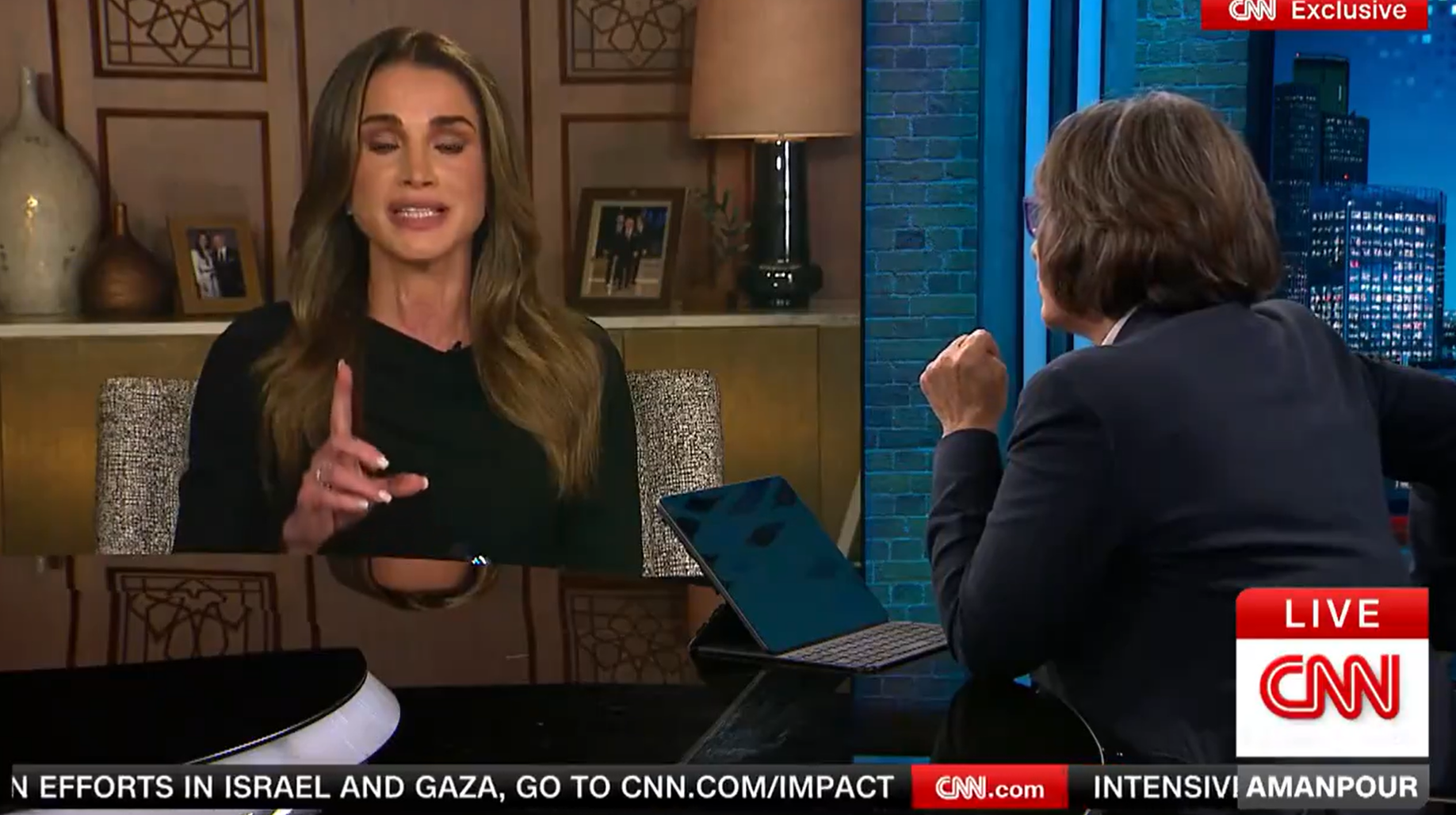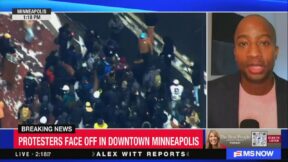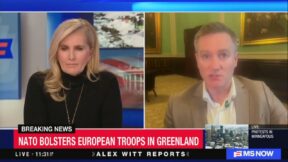Christiane Amanpour Criticized CNN’s Trump Town Hall. Her Queen Rania Interview Was Worse.

CNN’s Christiane Amanpour was highly critical of a town hall her employer hosted with former President Donald Trump earlier this year, suggesting that “maybe less is more” when it comes to platforming untruthful — and as she sees it — dangerous interviewees.
“Maybe we should revert back to the newspaper editors and TV chiefs of the 1950s, who in the end refused to allow McCarthyism onto their pages unless his foul lies, his witch hunts and his rants reached the basic evidence level required in a court of law,” she argued in a speech before graduates of Columbia University’s journalism school in May.
Those haughty sentiments might have been top of mind for those who had the displeasure of seeing her own interview with Queen Rania of Jordan on Tuesday, which served as a perfect anti-example of how aspiring journalists should approach conversations with powerful, self-interested actors.
Amanpour allowed Rania a platform from which to spew falsehoods and spurious arguments unchecked, chiming in on occasion mostly to tee the royal up for more of them.
Her first question was a sign of things to come: “Can I ask you first as an Arab, as a Palestinian, as a human being, a mother, how you’re feeling ever since October 7?”
This vague query set the tone for the interview, allowing Rania to paint her own picture of the events of the last several weeks.
“I cannot begin to describe to you the depth of the grief, the pain, and the shock that we are feeling here in Jordan,” began the queen. “As a mom, we’ve seen Palestinian mothers who’ve had to write the names of their children on their hands because the chances of them being shot to death, of their bodies turning into corpses are so high. I just want to remind the world that Palestinian mothers love their children just as much as any other mother in the world. And for them to have to go through this is just unbelievable.”
Rania went on to assert, “When October 7 happened, the world immediately and unequivocally stood by Israel and its right to defend itself and condemned the attacks that happened,” before suggesting that a “glaring double standard” benefitted the Israelis and plagued the Palestinians.
When Amanpour finally got around to speaking again, she asked Rania about what she “felt” on October 7 specifically. To the interviewer’s credit, she identified that her interlocutor had not addressed the manifest suffering of Israelis after a historically deadly and barbaric terrorist attack. Notably, however, she allowed Rania’s assertion that the world had expressed solidarity with Israel to stand unquestioned even though much of the Arab world, including Jordan, had done the opposite.
On the day of the attack, the Jordanian foreign ministry released an inexplicable statement condemning “Israeli attacks and violations against the Palestinian people and Islamic sanctities.”
Responding to Amanpour’s question, Rania professed to be “shocked” but said nothing more about the specific horrors of that day and quickly pivoted back to lamenting the hypocrisy of the world, rather than herself.
As her answer dragged on, Rania continued to gloss over the atrocities of Oct. 7:
I just want to emphasize that what happened, this conflict did not begin on October 7, although it has been being portrayed as that. You know, most networks are covering the story under the title of Israel at War. But for many Palestinians on the other side of the separation wall, on the other side of the barbed wire, war has never left. This is a 75-year-old story, a story of overwhelming death and displacement to the Palestinian people. It is a story of an occupation under an apartheid regime that occupies land, that demolishes houses, confiscates lands, military incursions, night raids. You know, the context of a nuclear armed regional superpower that occupies, oppresses and commits daily documented crimes against Palestinians is missing from the narrative.
One should have expected some measure of pushback from Amanpour here on this series of one-sided misrepresentations — even just a simple devil’s advocate presentation of the Israeli perspective.
Instead, Amanpour merely noted that Rania would be criticized by “Israel and its supporters,” recited some of her recent broadsides against the world’s only Jewish-majority state, and asked if she felt she has a “particular voice, you know, as queen of Jordan, in a country that has a peace treaty with Israel, to speak up?”
She might as well have just swooned, “Your Majesty, whatever inspired you to be so stunning and brave?”
The conversation proceeded apace, with Rania smearing Israel, avoiding condemnations of Hamas, and Amanpour failing to challenge her.
The pièce de résistance of the exchange, however, came when Amanpour asked Rania about her husband’s declaration that Jordan will accept “no refugees” from Gaza in the coming days.
Rania replied:
Well, look, the people of Gaza now are are facing two choices. Either they leave or they face death or collective punishment. So essentially, they’re given a choice between expulsion or extermination. Between ethnic cleansing and genocide. And no people should be given, have to face that kind of choice. And what my husband was referring to is the people of Palestine should not, of Gaza should not be forced to be moved again there. Most of the residents of Gaza are already refugees and right now at least a million have been displaced from their homes. So we do not want another mass displacement of Palestinians like what happened at the Nakba in 1948. And that’s what my husband meant about this being a red line. The Palestinians have the right to remain on their land.
“Yeah, because they were concerned about so-called forcible transfer and never being allowed to come back,” agreed Amanpour.
This is complete and utter nonsense, and Amanpour should not have lent it legitimacy.
Palestinians have a right to their land, yes. But that land is now a warzone where hundreds of hostages are being held by Hamas. Israeli leaders are not only justified in launching a ground invasion of Gaza to root out the terrorists working toward its destruction, it’s their solemn responsibility to carry out such an operation — as rockets continue to fly at Israeli cities.
Allowing a select number of refugees — even if only women and children — to leave Gaza for Jordan voluntarily until the war is over would doubtlessly save the innocent lives Rania says she mourns so deeply.
But the first concern of the queen and her husband is not innocent lives; it’s their own regime. They would apparently rather see Palestinians die and blame Israel than expend their own resources taking care of refugees, whom they also likely view as security risks due to the high concentration of terrorist activity in Gaza.
King Abdullah made his motivations clear when he declared, “This is a situation that has to be handled within Gaza and the West Bank.”
“You don’t have to carry this out on the shoulders of others,” he added, calling this a “red line” for his government.
If Christiane Amanpour had an objective beyond providing Rania with a podium from which to propagandize, it didn’t show.
And if she had any memory of the criticism of her colleagues that she leveled just a few months ago, it didn’t show.
This is an opinion piece. The views expressed in this article are those of just the author.





Comments
↓ Scroll down for comments ↓